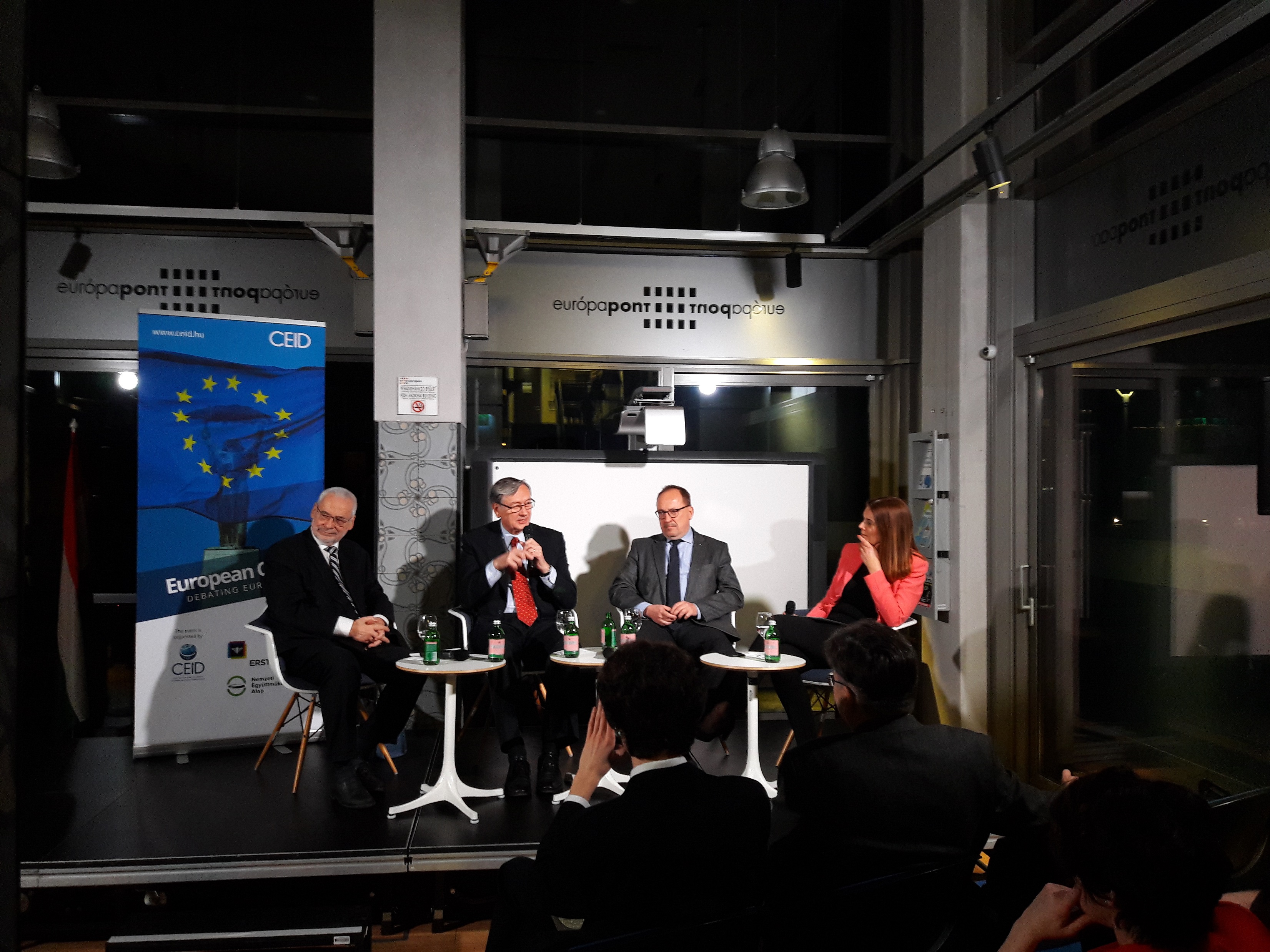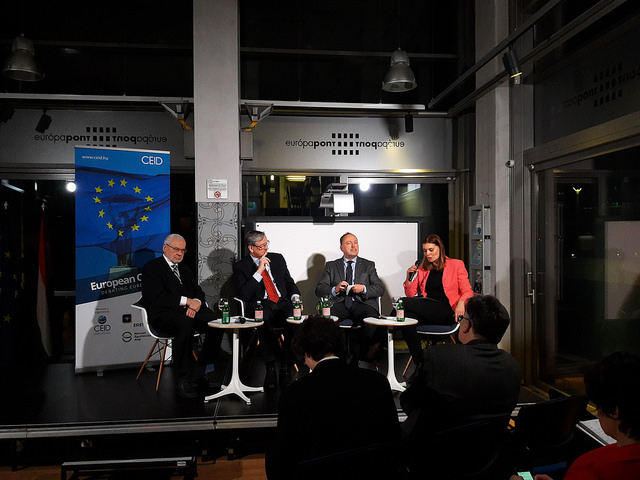
17 Feb European Café: Central Europe – A Region to Lead or to Fail? (Event Summary)
 On 14th of February 2017, CEID’s European Café held a discussion with the title: “The Role and Responsibility of Central Europe in the EU – A Region to Lead or to Fail?” The speakers of the panel were Professor Danilo Türk, former President of the Republic of Slovenia, Dr. Erhard Busek, former Vice-Chancellor of Austria and Mr. Zsolt Németh, Chairman of the Foreign Affairs Committee of the Hungarian Parliament.
On 14th of February 2017, CEID’s European Café held a discussion with the title: “The Role and Responsibility of Central Europe in the EU – A Region to Lead or to Fail?” The speakers of the panel were Professor Danilo Türk, former President of the Republic of Slovenia, Dr. Erhard Busek, former Vice-Chancellor of Austria and Mr. Zsolt Németh, Chairman of the Foreign Affairs Committee of the Hungarian Parliament.
Although – according to several surveys – Europe is still the best place to live, some EU member states are contemplating leaving the Union. What role can Central Europe play in the EU and what are the interests, the responsibilities, and the possible tasks of our region?
When speaking about Central Europe, we first have to define the term: What do we mean by CE? Are the countries between Russia and Germany considered as CE or only the states from the former Habsburg monarchy? In the 21st century, does it make sense to talk about Central Europe at all?
Dr. Busek opened the discussion by comparing the CE countries to a system of moving balls. The definition depends on the angle one takes when looking at the system. Yet, it has never been a real political entity. He emphasized that the focus on finding a fixed definition of the system should be loosened – rather possible fields for cooperation should be identified. The fields for cooperation, however, are not valid for the whole CE-region. Dr. Busek sees the development of the current multilateral relations – affected by the election of the new US-president – as a chance to make Europe more independent. Nevertheless, this can be only achieved by knowing each other and our needs as well. It is only then possible to develop strategies we all can benefit from.
Professor Türk sees the need of defining common priorities as a base for cooperation. As the former President of Slovenia, he mentioned three aspects when talking about identities: Slovenia as part of Central Europe, as a Balkan country and as a Mediterranean country – showing that a split perspective is necessary to understand the real nature of the country.
Mr. Németh also pointed out that no clear-cut definition of the region was possible, though from his perspective, the countries between Russia and Germany should be considered as CE. Nonetheless, he highlighted the importance of setting the conditions for CE to make it a political player – which is actually the goal of the V4 countries, according to Hungarian Prime Minister Orbán.
But is there a chance to institutionalize, to create an entity to represent CE on an international level? An entity, which would go somewhat beyond the V4, which is having a tarnished image in the West? Dr. Busek pointed out that the V4+2 already resembles to a kind of institutionalized cooperation, which was created by reacting to the migration crisis. It would be necessary to cooperate in other areas, such as in the fight against terrorism and criminality. However, considering that Europe is not only about an economic or technological cooperation, but also about rather a metaphysical concept that builds on cultural or even spiritual values, there is an urgent need to give Europe a soul.
Professor Türk pointed out that this is what people brings together in CE – the fact of belonging to a cultural identity. Europe needs a soul unifying people in the same way as it is done in CE. Currently people lose their “spirit” when talking about the EU. To underline his statement Mr. Türk brought Slovenians as an example: they see Europe as a mere place that guarantees prosperity and safety. Following up, Mr. Németh emphasized the importance of establishing a European identity by encouraging a national identity as well. For him it is a turning point, which will decide about the future of the EU. Pan-European feelings resemble to a dream, while radical movements, which try to bring back the nationalism and nation states of the 19th century, challenge Europe. Strong nations can create a strong Europe – for Mr. Németh this is the way to enable Europe to get closer to the solution of its problems.
Mr. Türk strongly disagreed with this idea: from his perspective, the EU stands on two, coexisting pillars – sovereign nation states and the transnational aspects. The right balance between both has not been found: putting too much focus (or weight) on one pillar would cause the house to collapse. Mr. Busek agreed that both pillars were important to consider. Speaking from his experience, Austria could solve many problems with the help of Slovenia and Hungary, but some solutions could not be applied to West Austria. Furthermore, Busek stated, that Europe should accept representing only 7% of the global population and stop forcing a stronger Europe, but rather focus on what Europe can contribute to the human race and the world. Therefore, cooperation is necessary. Mr. Németh brought up the issue of social conservatism – the preservation of national identities – which is an idea shared by a broad majority of the population within Central Europe. For this reason, he added, more centralization in Europe would cause more resistance in the region. Though, he acknowledged that Hungary benefitted from the economy of the EU by becoming more competitive – developments like this can be used as a value.
As for specific common project, investments in security were mentioned, e.g. from the Cohesion Fund. Mr. Türk pointed out that a lot of money had been spent in a way without a visible progress. The main desire of the citizens is peace, stated Mr. Busek, and to foster peace, we all need to work closely together – politicians and civil society. The more flowers flourish the better it is, repeated Mr. Németh as well. Central Europe needs the civil society and a forum to generate a common thinking throughout the region. Still leadership is necessary since the civil society does not provide stability and leadership. Mr. Türk disagreed: great leaders are usually born by great drama, but so far the drama was not big enough to give birth to a great leader, he concluded Türk.
At the end of the event, the speakers answered a number of questions from the audience. Among them, whether some transfers from the Cohesion Fund should be used to invest into military. Another question dealt with the risk of disintegration in Europe. The speakers agreed that the risk existed, but they seemed optimistic. In order to fight the current crises, one common project could be the strengthening of security, somewhat similarly to the Marshall Fund after the World War II.
The event took place in the framework of the European Café.
Disclaimer: The views and opinions expressed in this article are those of the authors and do not necessarily reflect those of the publisher.

